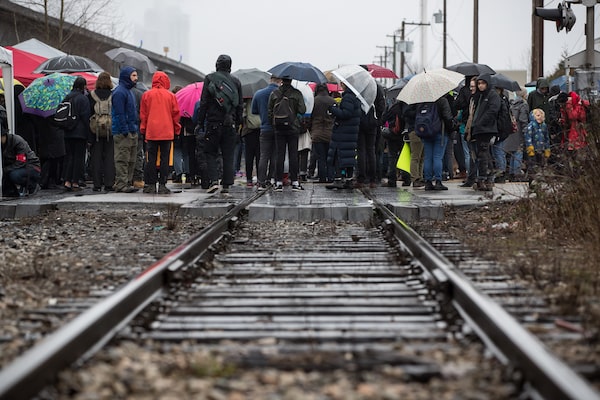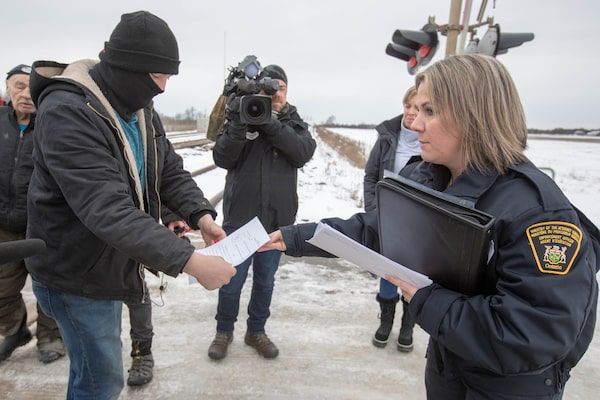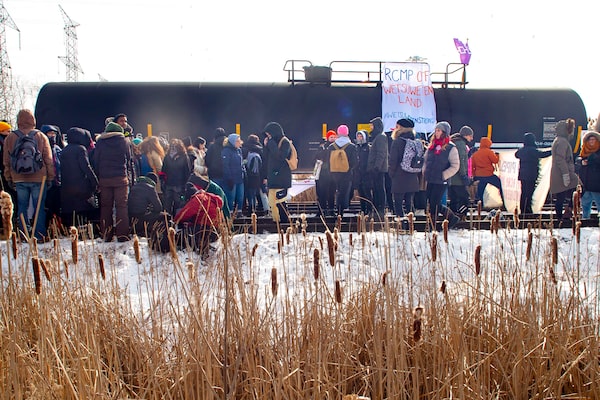Canada's Indigenous Services Minister Marc Miller after meeting with representatives of the Mohawk Nation at the site of a rail stoppage on Tyendinaga Mohawk Territory, as part of a protest against British Columbia's Coastal GasLink pipeline, in Tyendinaga, Ontario, Canada February 15, 2020.CARLOS OSORIO/Reuters
Indigenous Services Minister Marc Miller said hours of talks with an Ontario First Nation yielded “modest” progress and he’ll be taking a message to Prime Minister Justin Trudeau and his cabinet about next steps in anti-pipeline dispute that has crippled the country’s rail system.
Mr. Miller arrived at the Tyendinaga rail crossing Saturday morning on the 10th day of a blockade that has brought much of Canada’s passenger and freight railway transportation to a halt.
Emerging from a seven-hour meeting with the Mohawk community near Belleville, Ont., Mr. Miller said “modest progress” has been made, but it appeared the blockade would remain in place for now.
He said he would be speaking with Mr. Trudeau later Saturday night.
Trudeau will not direct police to break up pipeline protests, sticks to negotiated strategy
Wet’suwet’en chiefs vs. RCMP: A guide to the dispute over B.C.’s Coastal GasLink pipeline
“I have a few messages that I need to [get] back to the prime minister...and discussing with my cabinet about what the next steps are. They aren’t easy, no one said they were. The underlying issues did not arise yesterday,” Mr. Miller told reporters.
“The focus ultimately is on the situation in B.C. So there needs to be some work that needs to be done quite expeditiously,” he said, adding “if and when we resolve this.”
Mr. Miller told reporters before the meeting that he wants to start a dialogue with members of the community, stressing that the situation is tense and volatile. The protest in support of Wet’suwet’en Nation opposition to the Coastal GasLink pipeline in northern British Columbia involves a small number of members from Tyendinaga Mohawk Territory.
“Today is a chance to talk, have a real discussion. We’re a nation of people who have stopped talking to each other,” said Mr. Miller, who speaks the Mohawk language.
He added the community wants a peaceful resolution. He said he’s concerned with the growing tides of racism and bigotry towards indigenous people over the blockades.
Asked if any concrete decisions were made regarding the blockade, Mr. Miller said that out of respect for the people in the room he’s keeping the message confidential. “We’ll take the next steps from there but I believe we’re committed to resolve this in peace. This needs to be done expeditiously but there’s a number of issues that need to get resolved.”

Indigenous Services Minister Marc Miller is surrounded by media as he arrives for a meeting with protesters at a rail blockade on the tenth day of demonstration in Tyendinaga, near Belleville, Ont., Saturday, Feb. 15, 2020.Lars Hagberg/The Canadian Press
The B.C. project at the heart of the protests is a 670-kilometre pipeline to feed a $40-billion liquefied natural gas plant in Kitimat. Several First Nations - including elected band councils along the pipeline route - support the venture. Others, including some Wet’suwet’en hereditary chiefs, do not and have defied a court order and blocked construction.
Mr. Miller had previously asked Indigenous leadership to help bring down the blockade before his visit, but said he doesn’t know if that will happen.
The country’s largest freight rail carrier, Canadian National Railway Co., has obtained a court injunction against the blockade. The Ontario Provincial Police have talked with protesters throughout the week, but have not taken action to dismantle the protest near the train tracks.

Protesters blockade CN Rail tracks in Vancouver, B.C., Saturday, Feb. 15, 2020. The protest is in solidarity with the Wet'suwet'en hereditary chiefs opposed to the LNG pipeline in northern British Columbia.DARRYL DYCK/The Canadian Press
“I can’t guarantee what the outcome will be,” Mr. Miller said. “I don’t deal in what-ifs. I deal in what-about-now. And that’s what we’re going to do. We’re going to talk, we’re going to have some frank discussions.”
Protesters, meanwhile, refused to talk to the media and told waiting journalists to “go home.” Their protest was started without the support of their chief and band council.
Mr. Miller acknowledged the economic impacts of the protests. Several rail blockades went up a week ago across Canada, but many have since been removed.
The Ontario protest prompted CN to suspend operations on its network east of Toronto on Thursday, a move that could lead to as many as 6,000 layoffs, the Teamsters Canada Rail Conference union said.

A court injunction is presented to members of the Mohawk Territory as they block the CN/VIA train tracks in Tyendinaga Mohawk Territory, near Belleville, Ont., on Tuesday, Feb. 11, 2020, in support of Wet'suwet'en's blockade of natural gas pipeline in northern B.C.Lars Hagberg/The Canadian Press
“Canadians are divided on this, Indigenous communities are divided on this. We can’t use that against each other,” Mr. Miller said.
Asked why it’s taken him until now to meet with the activists, Mr. Miller said he waited to be invited and ensure the proper protocols were followed. He noted women in the community helped arrange the meeting.
On Friday, Prime Minister Justin Trudeau defended his government’s efforts to handle the protests, urging a negotiated resolution to the blockades.
Mr. Trudeau said politicians should not be telling the police how to deal with protesters, and that he and his senior ministers have been in regular contact with premiers and others to find a solution.
Federal Conservative Leader Andrew Scheer called on police to enforce court orders and end the blockades, and criticized protesters as misguided activists who are damaging the economy and ignoring the wishes of elected First Nations leaders.
In a video posted to YouTube of the meeting at the rail crossing, a woman reads a letter to Mr. Miller in support of the Wet’suwet’en Nation. “Currently our allies of the Wet’suwet’en nation are under surveillance and attack from the Royal Canadian Mounted Police,” she said. “The Wet’suwet’en do not want the pipelines to cross their land.”
She said Mr. Trudeau and Governor-General Julie Payette like to speak about the importance of Canada’s relationship with indigenous people. “But they continue to complete acts of genocide when the rest of the world isn’t looking,” she said in the video, which was uploaded by indigenous group Real Peoples Media.

Protesters are seen during a blockade of the rail line at Macmillan Yard in Toronto, Saturday, Feb. 15, 2020.Chris Young/The Canadian Press
Another demonstrator, identified as Seth LeFort, told Mr. Miller that, “This is our land. We’re not off the reserve. You put train tracks on our land...it’s our land forever.”
Meanwhile, the federal NDP said they would be requesting an emergency debate in the House of Commons on Tuesday to discuss the situation in Wet’suwet’en.
“The Prime Minister’s refusal to take more substantive and timely action has allowed tensions to rise, put significant pressure on the Canadian economy, and threatened jobs across the country,” reads a letter to Speaker Anthony Rota from NDP MP Peter Julian.
Our Morning Update and Evening Update newsletters are written by Globe editors, giving you a concise summary of the day’s most important headlines. Sign up today.
 Laura Stone
Laura Stone